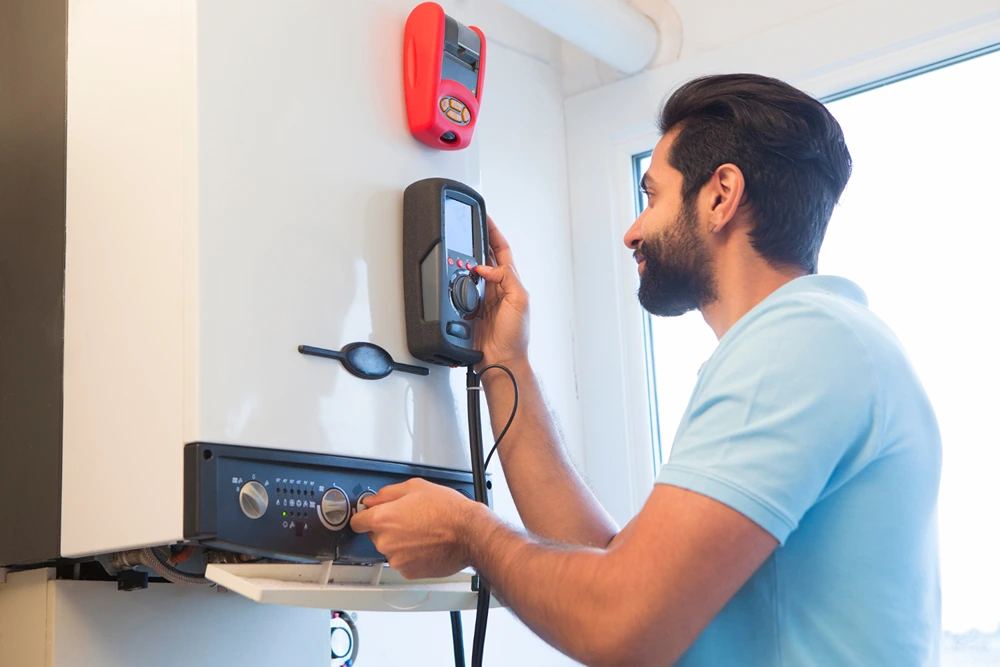Is replacing your old boiler worth the investment? Homeowners in Glasgow and central Scotland often face this crucial question. While the lure of potential energy savings and enhanced comfort is enticing, the initial costs and installation challenges are significant concerns. This article navigates the pros and cons of upgrading your heating system, highlighting key factors like energy efficiency, cost savings, and potential pitfalls. By the end, you’ll have a comprehensive understanding of whether replacing your ageing boiler is the right move for your home.

Benefits of Replacing an Old Boiler
Replacing an old boiler can significantly lower heating bills due to increased energy efficiency. Modern boilers are designed to be more efficient, reducing the amount of fuel needed to heat your home. Understanding how does a gas boiler work can further illuminate the benefits of upgrading. Gas boilers operate by burning natural gas to heat water, which is then circulated through radiators or underfloor heating systems. This process is optimized in modern systems to ensure maximum heat output with minimal fuel consumption, making them a cost-effective and environmentally friendly choice. This not only saves money but also contributes to a greener environment. Additionally, new boilers reduce the frequency and cost of repairs, as they are less prone to breakdowns.
- Lower heating bills
- Reduced repair frequency
- Quieter operation
- Better heating controls
- Greater comfort
- Enhanced safety
Modern boilers operate more quietly because of advanced designs and high-quality parts. They also provide better heating controls for more accurate temperature adjustments, leading to greater comfort. Enhanced safety features in new boilers reduce the risk of malfunctions and potential hazards, ensuring a safer living environment. The combined benefits make replacing an old boiler a valuable investment for any homeowner. Exploring the benefits of installing a new boiler reveals even more advantages, such as improved reliability and advanced technology features. These enhancements not only contribute to a more comfortable living environment but also ensure peace of mind with safer and more efficient heating solutions.
Drawbacks of Replacing an Old Boiler
Replacing an old boiler involves several potential drawbacks, primarily centred around costs, installation challenges, and system compatibility. The initial investment for a new boiler can be significant, particularly if opting for a high-efficiency model. These models, while offering long-term savings, require a higher upfront cost. The installation process can be time-consuming and disruptive, often necessitating household adjustments to accommodate the new system. Existing heating systems might need substantial alterations, further increasing the overall expense. Additionally, compatibility issues can arise, particularly in older homes, requiring additional components or modifications to ensure the new boiler functions correctly.
| Drawback | Description |
|---|---|
| High Upfront Cost | The initial purchase and installation of a new boiler can be expensive, especially for high-efficiency models. |
| Installation Time and Disruption | Installing a new boiler can be time-consuming and may cause significant disruptions in the household. |
| System Alterations | Existing systems may require modifications to accommodate the new boiler, adding to the overall cost. |
| Compatibility Issues | Older homes may face compatibility issues, necessitating additional adjustments or components. |
These drawbacks underline the importance of thorough planning and professional assessment before committing to a boiler replacement. Timing and preparation are crucial to ensure a smooth transition and to minimize potential disruptions. Consulting with professionals can provide valuable insights into the best time to replace your boiler, ensuring compatibility with existing systems and maximizing efficiency gains. Ensuring that the new system is compatible with your existing infrastructure can mitigate some of these challenges. Considering the potential household disruption and additional costs associated with system alterations is crucial. While the long-term benefits of a new boiler can be substantial, the initial hurdles and expenses must be carefully weighed to make an informed decision.
Cost Considerations for Boiler Replacement
The initial costs of replacing an old boiler can be substantial, particularly when choosing high-efficiency models. For homeowners curious about how much is a new boiler, it’s important to consider not just the purchase price but also installation and potential system modifications. While the upfront investment may seem daunting, the long-term savings on energy bills and reduced repair costs often justify the expense. These modern boilers, while offering long-term savings through reduced energy consumption, require a significant upfront investment. Installation expenses further add to the overall cost, as professional installation is critical for optimal performance and safety. This process often involves not only the cost of the boiler itself but also additional materials and labour.
- Initial purchase cost
- Installation expenses
- Maintenance costs
- Operational costs
- Available financing options and government schemes
Long-term savings on energy bills can help offset the initial investment. Modern boilers are designed to be more efficient, using less fuel to produce the same amount of heat. This efficiency translates to lower energy bills over time, making the high initial cost more manageable. Additionally, various financing options and government schemes are available to alleviate the financial burden. These options can include payment plans, grants, or subsidies, which can make the investment more accessible.
When considering boiler replacement, it’s crucial to take into account the total life cost, including ongoing maintenance and operational expenses. Regular maintenance ensures the boiler operates efficiently and extends its lifespan, reducing the likelihood of costly repairs. Operational costs, including fuel consumption, should also be factored into the decision-making process. By evaluating these aspects, homeowners can make a more informed choice that balances initial investment with long-term savings and efficiency.

Impact on Energy Efficiency and Environmental Benefits
Replacing an old boiler can significantly enhance energy efficiency, leading to lower energy bills. The impact of a new boiler on energy bills is profound, as modern systems are designed to optimize fuel use and reduce waste. This efficiency not only benefits the environment but also translates into tangible financial savings for homeowners, making the investment in a new boiler a strategic choice for long-term cost management. Modern boilers are designed to maximise fuel use, reducing the amount of energy required to heat your home. This efficiency not only translates into cost savings but also contributes to a reduction in overall energy consumption. By burning less fuel, the environmental impact is mitigated, promoting energy conservation and sustainability.
- Improved energy efficiency
- Lower energy bills
- Reduced carbon footprint
- Environmental conservation
- Eco-friendly technologies
The reduction in carbon emissions is a key environmental benefit of replacing an old boiler. New boilers typically have higher energy ratings, meaning they produce fewer emissions per unit of energy consumed. This reduction in emissions helps lower the carbon footprint of a household, contributing to global efforts in combating climate change. Additionally, modern boilers incorporate eco-friendly technologies, such as condensing mechanisms that recycle heat, further enhancing their environmental performance.
Eco-friendly technologies in new boilers also play a crucial role in boosting energy efficiency and environmental benefits. These technologies often include advanced combustion systems and intelligent controls that optimise performance and minimise waste. Higher energy ratings and compliance with stringent environmental standards ensure that new boilers not only meet but exceed current regulatory requirements. The long-term environmental benefits of replacing an old boiler are substantial, making it a prudent choice for homeowners looking to reduce their environmental impact.
Potential Risks and Challenges with Old Boilers
Old boilers present several significant risks and challenges, primarily related to safety concerns and inefficiency. Over time, the efficiency of these units diminishes, leading to higher energy consumption and increased energy bills. Safety risks are also a major concern, as older boilers are more prone to issues such as carbon monoxide emissions and leaks. These hazards can pose serious threats to the health and safety of household occupants. Furthermore, the likelihood of frequent breakdowns increases with aging boilers, making them unreliable and often leaving homeowners without heat during critical times.
- Frequent breakdowns
- Safety risks (e.g., carbon monoxide emissions)
- Higher energy consumption
- Increased energy bills
- Costly repairs
- Diminished efficiency
The financial burden associated with maintaining an old boiler can be substantial. Frequent repairs not only add up in cost but also cause inconvenience and potential disruptions to daily life. As the boiler’s efficiency continues to decline, operational costs rise, making an old boiler more expensive to run over time. The combination of increased energy bills, regular maintenance, and repair expenses can quickly outweigh the initial savings of postponing a boiler replacement. Therefore, understanding these risks and challenges is crucial for homeowners when considering the long-term viability of their current boiler system.
Practical Advice for Deciding on Boiler Replacement
Deciding whether to replace an old boiler involves several key considerations. Evaluating the age and condition of the boiler is the first step. Boilers typically have a lifespan of 10-15 years, and as they age, their efficiency decreases, leading to higher operational costs. If your boiler is nearing this age range or has visible signs of wear and tear, it might be time to consider a replacement. Additionally, assessing the frequency of breakdowns is crucial. Frequent repairs not only indicate a declining system but also incur ongoing costs and inconvenience.
- Assess the age and condition of the boiler
- Evaluate the frequency of breakdowns
- Consider long-term cost savings and modern features
- Seek professional assessment and installation
- Compare repair costs with replacement costs
Professional assessment and installation are vital for ensuring that the new boiler is compatible with your existing heating system and operates efficiently. Understanding the different types of boilers available can help homeowners make informed choices that align with their specific needs and preferences. Each type offers unique features and benefits, from combi boilers to system boilers, providing options that cater to various household requirements and energy efficiency goals. A professional installer can provide a thorough evaluation of your current setup and recommend the best replacement options. They can also ensure that the installation is conducted safely and meets all regulatory standards. Proper installation can significantly impact the performance and longevity of your new boiler.
Comparing the cost of repairs with the price of a new boiler is another critical factor. While repairing an old boiler may seem cost-effective in the short term, the cumulative expenses of frequent repairs can quickly add up. Modern boilers offer enhanced features and efficiencies that can result in substantial long-term savings on energy bills. By weighing the immediate costs against the long-term benefits, homeowners can make a more informed decision regarding boiler replacement.

Final Words
Replacing an old boiler brings a mix of benefits and challenges. The process offers energy efficiency, cost savings, and increased comfort while posing significant initial investment and installation disruptions. Weighing the pros and cons is essential.
Long-term energy savings and reduced carbon footprints make modern boilers an attractive option. Understanding the potential risks and evaluating cost considerations provide a balanced view of the decision.
Ultimately, recognising the advantages and drawbacks of replacing an old boiler can guide homeowners toward making an informed, positive choice.
FAQ
Is it worth replacing an old boiler?
Replacing an old boiler can significantly lower heating bills due to increased efficiency. New boilers reduce repair costs and provide better heating controls, resulting in greater comfort and enhanced safety.
Is a 20-year-old boiler safe?
A 20-year-old boiler may pose safety risks, such as carbon monoxide emissions and leaks. Older boilers are less efficient and prone to frequent breakdowns, making them less reliable and potentially hazardous.
Should I replace my 10-year-old boiler?
The decision to replace a 10-year-old boiler depends on its condition, efficiency, and frequency of breakdowns. Modern boilers offer improved efficiency and lower operational costs, which can provide long-term savings.
How old is a too old boiler?
Boilers over 15 years old are generally considered too old, as they become less efficient and more prone to breakdowns. Replacing them with modern models can improve energy efficiency, safety, and overall performance.



